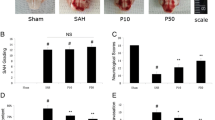Abstract.
Propofol has cerebral vascular and metabolic effects similar to those of barbiturates, and it is used to maintain neurosurgical anesthesia because it reduces cerebral metabolic rate, cerebral blood flow, and intracranial pressure. Although the use of propofol as a cerebral protectant during certain neurosurgical procedures has been advocated, consensus has not been reached as to a protective effect of propofol on cerebral ischemia. In this study we observed the neuroprotective effects of propofol during global cerebral ischemia-reperfusion injury by the use of four-vessel occlusion method in a rat model. We measured the levels of malondialdehyde as a marker of lipid peroxidation in ischemic tissue, and the results indicate that propofol plays a role in the inhibition of neuronal death induced by brain ischemia.
Similar content being viewed by others
Author information
Authors and Affiliations
Additional information
Electronic Publication
Rights and permissions
About this article
Cite this article
Ergün, R., Akdemir, G., Şen, S. et al. Neuroprotective effects of propofol following global cerebral ischemia in rats. Neurosurg Rev 25, 95–98 (2002). https://doi.org/10.1007/s101430100171
Received:
Accepted:
Published:
Issue Date:
DOI: https://doi.org/10.1007/s101430100171




